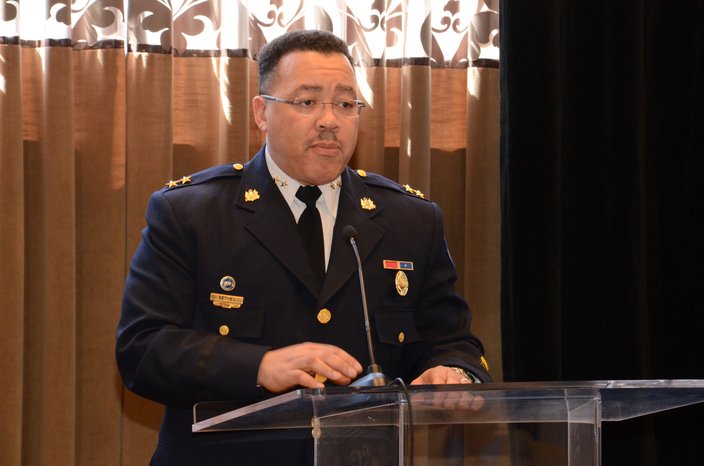The scenes from Baltimore on Monday depicted some of the worst urban unrest the United States has witnessed in decades.
Rioters looted stores, torched vehicles and hurled bricks at police officers just hours after the funeral of Freddie Gray, a 25-year-old black man who died in police custody earlier this month.
The response by officials, which included the deployment of the National Guard and declaration of a state of emergency, fell under considerable scrutiny Tuesday from critics claiming a delayed response enabled the riots to escalate.
It also begged questions of Philadelphia, a city experiencing its own tensions with law enforcement. How might the response have differed here? And what protocols do city officials have in place to prevent demonstrations from turning violent?
“Change comes through stepping up and creating change. It does not come from setting fire to a corner bodega ... Who does that benefit? ... Oftentimes, you see those areas never come back. We have areas here in Philadelphia, from the riots in the '60s, that still have never come back.” – Kevin Bethel, Philadelphia police deputy commissioner
The key, Philadelphia Police Deputy Commissioner Kevin Bethel said, is for police to be proactive, engaging the community and diffusing any tensions before a riot has the opportunity to begin.
In that regard, police employ a Civil Affairs unit — a group of plainclothes officers trained to mediate and diffuse any tensions that arise between police and the community. Police also use bike patrols to enable demonstrators to flow freely while keeping them contained.
"The objective is to avoid an incident, which never bodes well for anyone and particularly in the area where people live," Bethel said.
Once a riot sparks, Bethel said, the situation becomes very fluid and dynamic, requiring quick decisions by the police officials at the highest level.
“We’re trying to do what is best and trying to use the least force possible, but also understanding there are times that are going to require a specific level of force,” Bethel said. “Throwing rocks and injuring officers, setting fires — that destructive behavior is not acceptable.”
CHAIN OF COMMAND
Any decisions to use increased levels of force, such as tear gas, are authorized by Police Commissioner Charles Ramsey, with consultation from City Hall, Bethel said.
If needed, Philadelphia police can request support from the Pennsylvania State Police and the National Guard. But with 6,300 police officers, Bethel said, such a request would require a situation to have fallen out of hand.
Yet, Gov. Tom Wolf unilaterally can deploy the Pennsylvania National Guard in an emergency or if a riot appears imminent, press secretary Jeff Sheridan said.
“The Governor determines when an emergency (tumult, riot or disaster) exists or is threatened,” Sheridan wrote in an email, citing state law. “The Governor has plenary authority to determine whether a threat exists. The declaration of a disaster emergency is NOT a condition precedent to ordering the Pennsylvania National Guard to state active duty.”
Deputy Commissioner Kevin Bethel says Philadelphia Police can request support from the Pennsylvania State Police or the National Guard in the case of rioting. (Freedom G. Photography / For PhillyVoice)
The Baltimore riots
reportedly began as a “purge” organized by high schools students on social media. The term "purge" is an apparent reference to a 2013 movie of the same name in which crime is legalized.
Students encountered dozens of police officers at the Mondawmin Mall, where the purge was slated to begin before heading to Inner Harbor. They reportedly threw rocks and water bottles at the officers who had mobilized to prevent the purge.
By the end of the night, more than 200 people had been arrested as riots erupted. Fifteen structures, including a CVS store, and 144 vehicles had been set ablaze. Fifteen police officers were injured.
Bethel declined to critique Baltimore’s response, saying he does not know the entire situation. But he was critical of violent riots, saying it only brings harm to those communities.
“I get frustrated as an African-American sitting here,” Bethel said. “Change comes through stepping up and creating change. It does not come from setting fire to a corner bodega.
“Who does that benefit? ... Oftentimes, you see those areas never come back. We have areas here in Philadelphia, from the riots in the '60s, that still have never come back.”
POTENTIAL FOR RIOTS IN PHILLY, BUT UNLIKELY
The fatal shooting of unarmed Michael Brown in Ferguson, Missouri, last summer has placed police departments across the country under heavy scrutiny for their race relations and use of deadly force.
Philadelphia police have not been at the center of the national debate, but they are not immune from the conversation.
That report came days after District Attorney Seth Williams
cleared a pair of officers in the Dec. 15 shooting death of Brandon Tate-Brown.
Hundreds of Philadelphians have protested against police brutality and racism since the national dialogue gained steam. To date, those demonstrations have been peaceful.
But the riots that played out in Baltimore could occur in most major American cities, including Philly, said Rogers Smith, a political science professor at the University of Pennsylvania.
“The news stories have reinforced everyday experiences that have led to atmospheres of hostility and suspicion,” Smith said. “Any kind of violent confrontation could lead to civic strife.”
Smith doubted Baltimore will be the last city to witness rioting, particularly as the weather warms and confrontations become more likely.
Given the national atmosphere, Smith said Philadelphia has the potential for riots. But he did not find it likely.
“My sense is that although there are very deep dissatisfactions with the Philadelphia police force, we haven’t been in quite the volatile, easily combustible situation that they’ve had in Baltimore,” Smith said. “But that may be naïve. I think, unfortunately, we’re going to have to learn in the months ahead how far Philadelphia and other cities are resistant to these kinds of outbreaks.”

